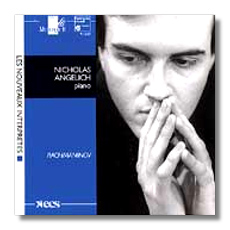
The Internet's Premier Classical Music Source
Related Links
- Rachmaninoff Reviews
- Latest Reviews
- More Reviews
-
By Composer
-
Collections
DVD & Blu-ray
Books
Concert Reviews
Articles/Interviews
Software
Audio
Search Amazon
Recommended Links
Site News
 CD Review
CD Review
Sergei Rachmaninoff

Études-tableaux
- Études-tableaux, Op. 33 (1911)
- Études-tableaux, Op. 39 (1917)
Nicholas Angelich, piano
Harmonia Mundi HMN911547 65:40 DDD
Rachmaninoff coyly declined to explain the imagery behind his Études-tableaux, responding, "I do not believe in the artist disclosing too much of his images. Let them paint for themselves what it most suggests."
For the artist in Angelich, these paintings are rendered in mezzo piano washes and tempi that shy from extremes. He keeps the musical surface smooth so he can indulge in graceful turns of phrase. I like the sensitivity in Op. 33/3, one of the few pieces in these sets that recalls the melodic splendor of the Préludes. A consequence of his delicacy is a tendency to miniaturize. His finger work is big league, but he lacks the anvil weight of Richter or the bizarre flights of Horowitz. Some of his sonorities sound more appropriate to Debussy. In the more forceful Études he doesn't apply enough muscle to make the appropriate dynamic contrasts. He's well recorded though, and I would recommend this disc as a complete set of the Études-tableaux, except that one of the Op. 33 Études is not included (there are nine in each set). Try Richter first. Demidenko (on Hyperion) also comes highly recommended.
Copyright © 1997, Robert J. Sullivan



















